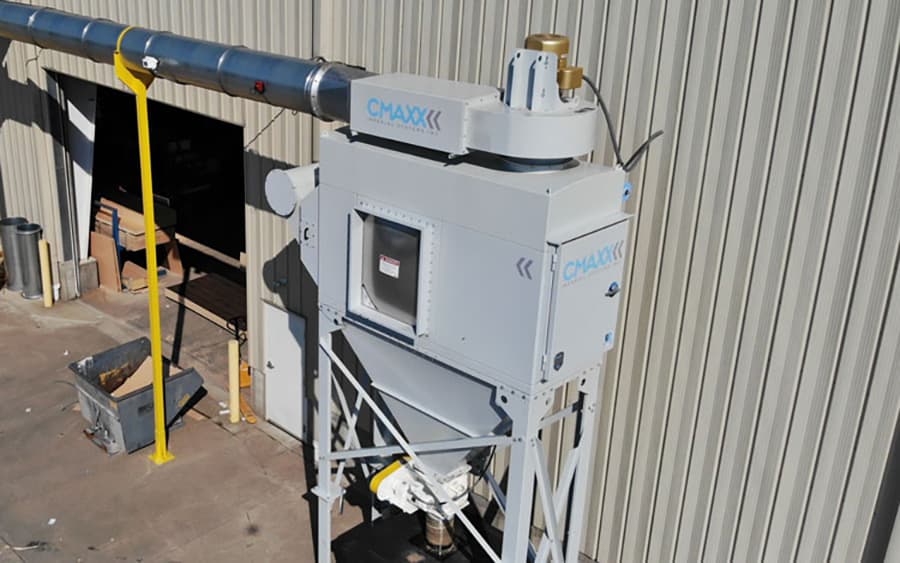
by Erin Long | Jun 29, 2021 | Case Studies
Motor Control Center Case Study
A steel manufacturing company had a problem keeping their motor control center (MCC) clean. Poor ventilation and filtration were allowing dust to get into the MCC room, which is a vital part of keeping the mill operational. They had recurring issues with the starters and controls due to the buildup of dust. The room was enclosed, but they were not able to keep the dust-laden air from getting inside.
Additionally, the customer had purchased a commercial-grade air handler with panel filters. They were replacing filters every week, costing them thousands of dollars per month. If you’ve ever been in a steel mill or a foundry, you would understand the large amount of dust that can accumulate. What the company needed was a self-cleaning dust collector. This would continuously clean the air while putting the room under positive pressure to keep small leaks from allowing dust to enter.
This company also needed a collector that could handle the large volume of dust that was accumulating in their facility. They needed a unit that would reliably keep their motor control center clean, protecting it from dust buildup.
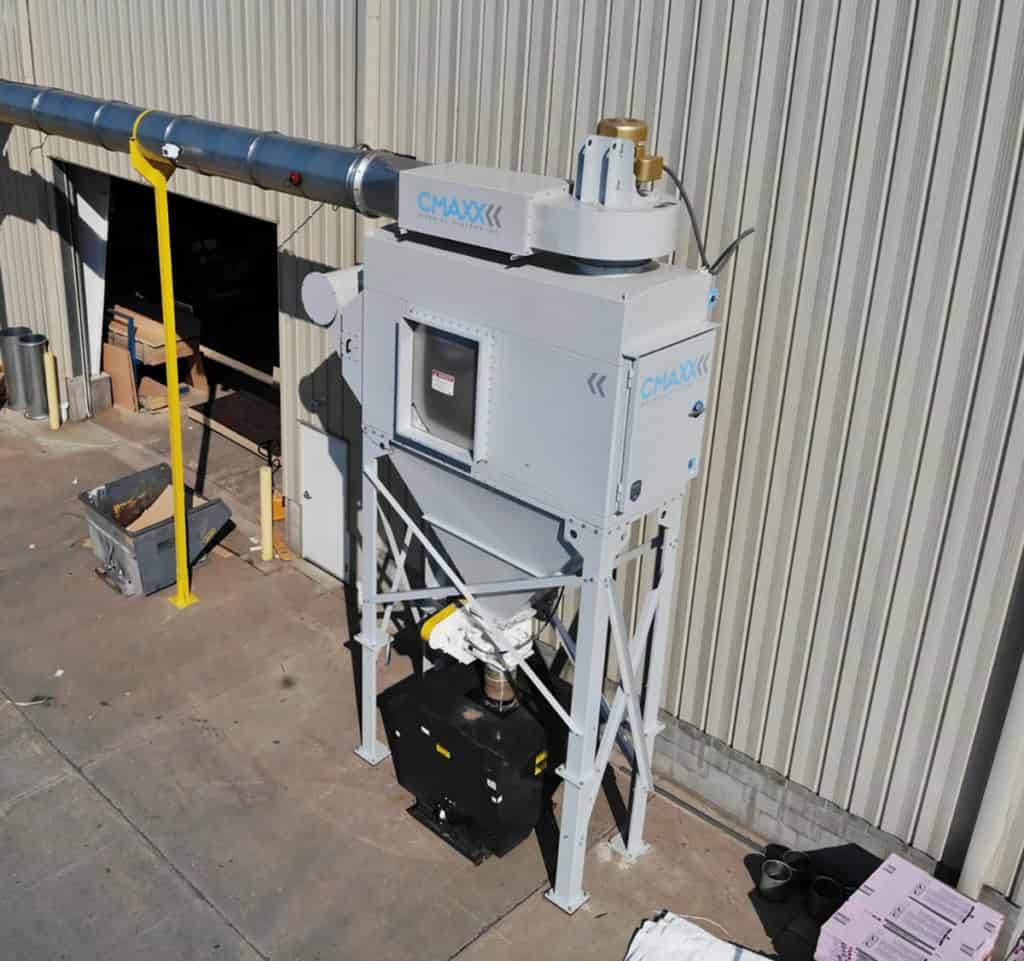 Challenge
Challenge
The application required taking existing air inside the control room, combining it with ambient plant air, and sending it through a dust collector. The cleaned air would then be returned to the control room. The reason for combining air from inside and outside the control room is to put the room under positive pressure. When the room is pressurized, any leaks around wires, poorly sealed doors, and other openings would have air blowing out. This keeps dirty air from getting in.
This customer was unsuccessfully using HVAC filters. The problem with these is that they are not designed to clean themselves like a dust collector. Once the HVAC filters were loaded up with dust, the customer was back to the same problem. Their goal was to filter the dust, having a system that would effectively capture even the finest material with filters that would last longer.
Solution
Imperial Systems supplied a CMAXX with a top-mounted fan and cleaning controls to this customer. The CMAXX takes dust-laden plant air, filters it, and fills the room with clean, positive pressure 24/7. Filter replacement went from once a week to an estimated two-year changeout period. Now the filters are out of sight and out of mind. Problem solved.
Contact an Imperial Systems representative today to get started cleaning up the motor control center for your facility. We will properly size a system and will work with your facilities staff. Let us show you how a system like this can save you downtime due to control room electrical failures.
Equipment List for This Motor Control Center
- 8,500 CFM fan at 6” SP
- CMAXX Model CM008
Read more
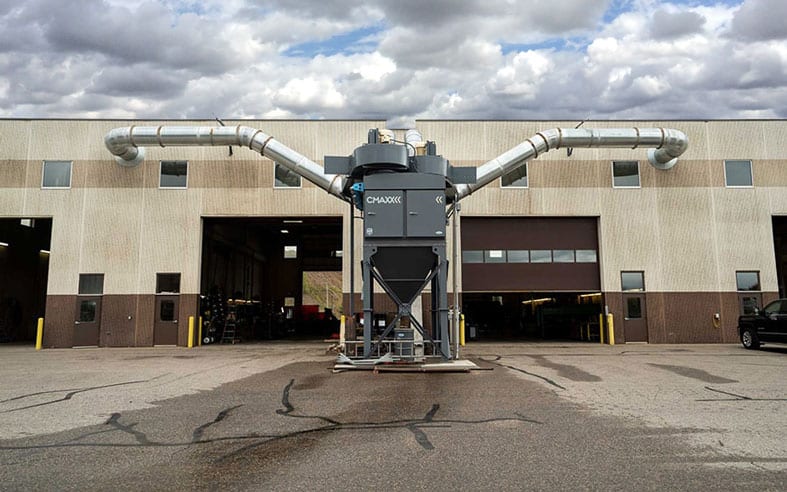
by Erin Long | Mar 2, 2021 | Case Studies
Summary
A Kansas City area custom countertop fabrication company had a dust collector that was inadequate. They were getting fine dust particulate throughout their shop. They needed a machine that could keep up with multiple CNC routers and filter the fine dust.
Application
The application involves processing a material called Solid Surface. This is a manmade material manufactured from a variety of resins. It is often used to manufacture customer countertops and other kitchen/bath products. This facility was producing dust with two CNC routers and two chop saws.
Challenges
This customer had fine dust particulate bypassing their current dust collector. They were using an open bag-style dust collector that was not designed to capture fine dust. The dust generated was potentially combustible, which had to be considered when designing this system. There were a few specific issues that had to be contemplated during system design. First, they had no way of putting the dust collector outside because they were landlocked with other companies on every side. Second, they are leasing the building, so they could not put holes through the roof. Lastly, they needed to have a larger hopper to avoid emptying dust too often, and needed to keep the system under 19’.
The customer’s goals were to filter the dust and have a system that would effectively capture even the finest material from the countertop fabrication operation. In their process, they also had a small amount of wood that was used while cutting the Solid Surface.
Solution for Countertop Fabrication Dust
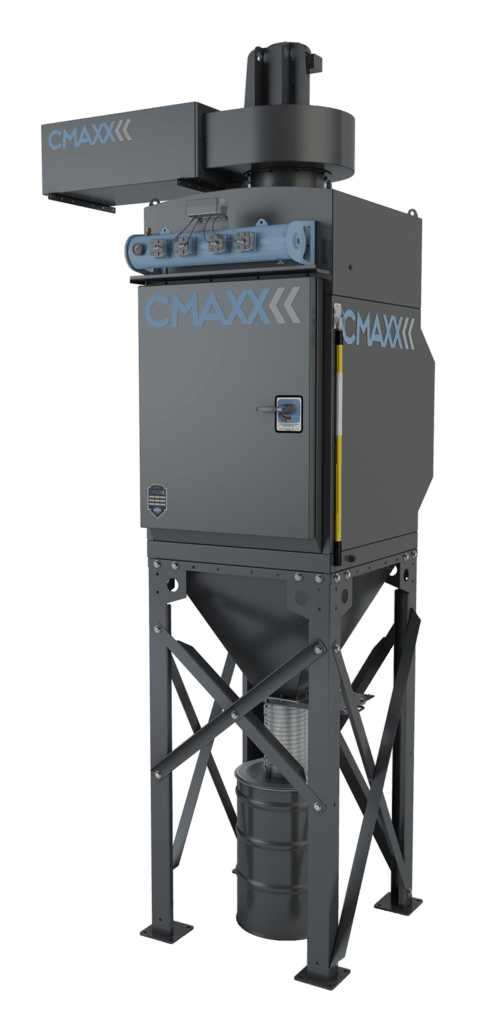
Patrick Mulligan of Imperial Systems worked with the project manager on this plan to purchase a new system. They first started working with Imperial Systems when they found us on the internet. Patrick reviewed their application and concerns to start the development of this system and then scheduled a site visit to review. With the concern of the potential combustible dust Patrick created a system that included:
- EIV Explosion Isolation Valve to protect return air in the event of a deflagration
- Flameless Explosion vent to protect the interior of the building from flame if there was an explosion. They did not go with a chemical explosion suppression agent or a ducted vent to the exterior of the building because the cost was prohibitive.
- IDA Inline Deflagration Arrestor – The customer wanted to return the air to the building to save on utilities and in addition, their lease caused issues venting outside. The Imperial IDA system stops a flame front in the event of a deflagration without the need for expensive secondary filters or other outlet isolation devices.
- DeltaMAXX Filters – MERV 15 rated Nanofiber Fire Retardant IDA filters. These filters are designed to capture the fine particulate
The beginning of the quoting process started in September of 2017 and the customer decided on Imperial Systems being the best partner for this project at the end of February 2018. After the order was received we designed, manufactured, and installed this turnkey system by the middle of April.
Equipment List
- CMAXX Model CM004
- IDA Inline Deflagration Arrestor
- Particulate Sensor
- Flameless Explosion Vent
- Explosion Isolation valve
- Abrasion Resistant Space Saving inlet
- Fan outlet Silencer
- Cast Airlock
- Self-Dumping Hopper
- DeltaMAXX Filters
- HP Top Mount Fan
- Integrated Control Panel
- ServiceMAXX system Install
If your own company does countertop fabrication using Solid Surface, granite, or some other material, contact us today to have a CMAXX sized and configured for your specific application.
Read more
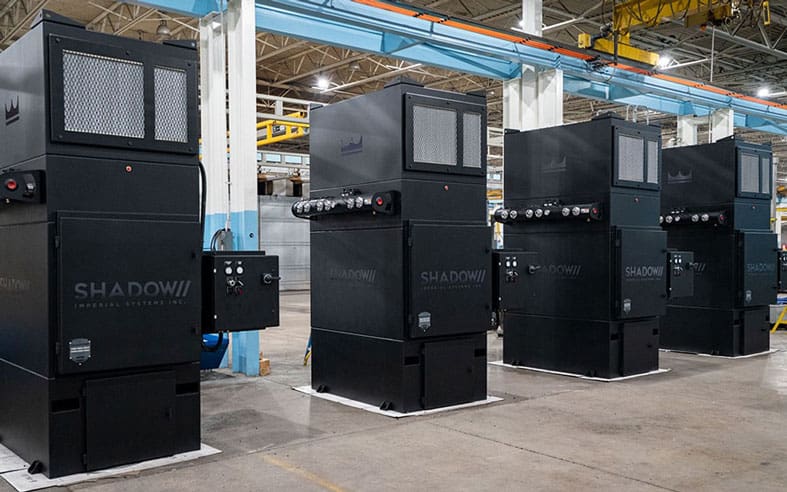
by Erin Long | Feb 5, 2021 | Case Studies
How a Tier 1 Automotive Parts Manufacturer Solved Their Robotic Weld Fume Issue Using the Imperial Systems Shadow Compact Fume Extractor
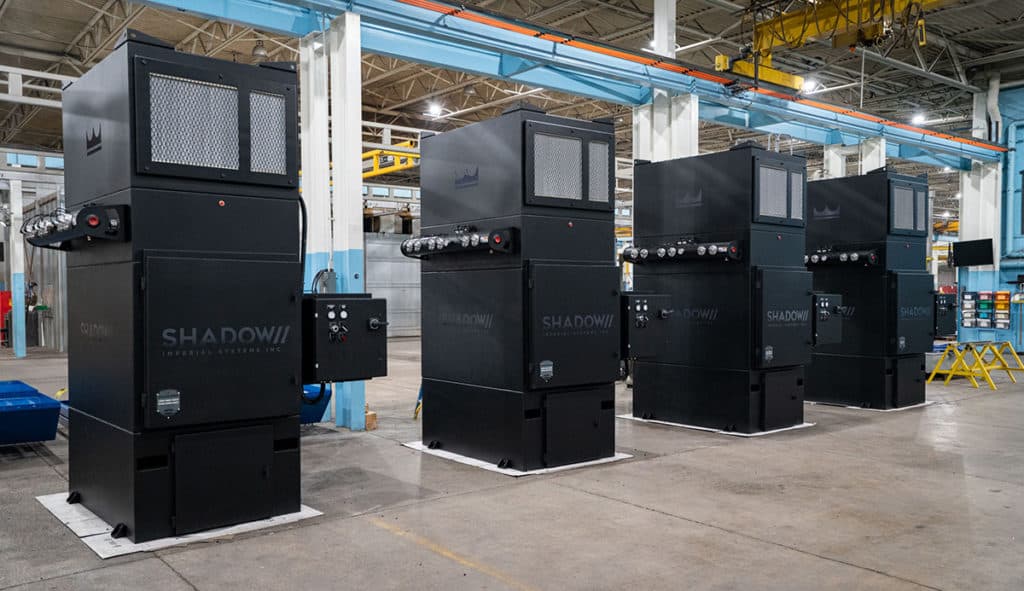
The Situation with Robotic Weld Fume
An automotive parts manufacturer located in the Atlanta Metro area had an issue with welding fume. It was causing unsightly and unsafe conditions in their robotic manufacturing area. Not only was there a haze in the air, but dust and fume settling on the walls and floor was causing a cleanliness issue.
The customer had equipment from one of our competitors installed for fume extraction of robotic weld cells. These three cells are where most of the fume was created due to the inadequate dust collectors. They were not handling enough air volume in the space to extract the fume, which was escaping into the facility through the weld positioners.
The Solution
Four Shadow SH06 Compact Fume Extractors were installed on their two types of robotic applications. The first three are installed on fully enclosed robotic welding cells. The fourth Shadow is being used on an enclosed robotic metal brazing cell.
Metal brazing is a process that joins two or more pieces of metal items together by melting or flowing a filler metal into the joint. This process is different than welding because the metal being joined is not being melted. This customer’s specific process generated a larger than normal concentration of weld fume that needed to be filtered from the manufacturing facility.
In the initial problem-solving process, Imperial Systems’ sales manager Justin Badger and a factory rep from HutchCo in Suwanee, Georgia made a site visit in early 2020. They spent time with the customer and the machine operators to determine their goals and see their problems. On the first visit, it became very clear what needed to be done.
First, they determined the size of the enclosed robot area and the expected fume load. With this information, they calculated the amount of air needed to properly ventilate the robot cell and keep escaping fume to a minimum. Next, they reviewed the layout of the building to determine the most convenient spot to install the dust and fume collector.
Once all the above information was gathered, they were able to create a fully engineered solution to solve the robotic weld fume issue. Following several months of COVID-19 related delays, the complete air filtration system was installed in early November 2020.
Success Extracting Robotic Weld Fume
Several weeks following the installation of the equipment, Imperial Systems did a standard follow-up call with the end-user. This was to get feedback on installation service, the sales process, and their satisfaction with the solution.
The customer (who wishes to remain anonymous due to company policy) said, “We are so happy with the results and cannot believe how clean the air in the building is now. Imperial Systems installation technicians were very professional. They worked very well around our extremely busy production schedule and finished ahead of schedule. We plan to have Imperial Systems back in January to install another (Shadow Compact Fume Extractor) machine on a new welding robot.”
Read more
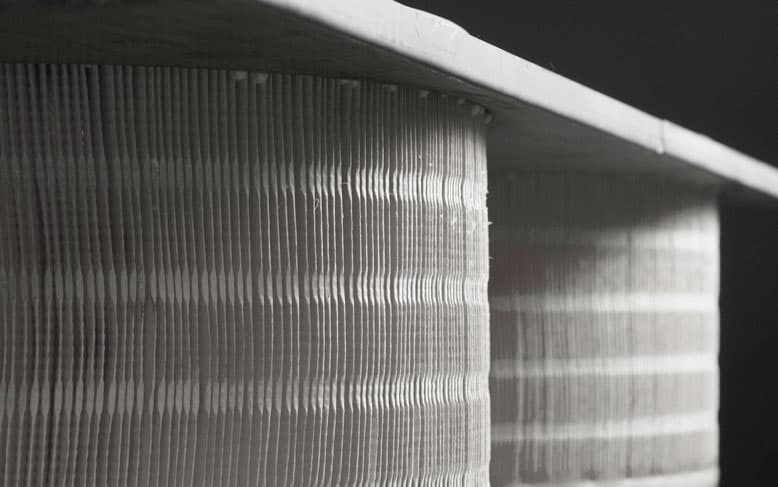
by Erin Long | Mar 9, 2020 | Case Studies
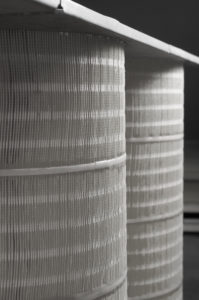
Problem:
Keith handles the dust collection equipment for a company that manufactures protein powder. Their customers include major health and wellness companies like GNC. The company currently owns 3 Imperial Systems CMAXX collectors and one competitor system.
Protein powder applications can put any dust collection system to the test. Keith found that his filters weren’t holding up. “I was cleaning them three or four times just to get some use out of them,” he says. “The dust was getting through them and into the HEPAs. Replacing them so often was a major strain on our budget. I really needed filters that could do better.”
Solution:
Keith decided to try Imperial Systems’ DeltaMAXX filters to see if they would last longer. He reports that the DeltaMAXX filters are lasting about 4 to 6 months, longer than the others he had tried. He also found that with the DeltaMAXX filters, they were no longer seeing any dust blowback as before.
Although happy with the filter life improvement, Keith says that filter changeouts are still costing the company too much money. With some troubleshooting, Keith’s Imperial Systems aftermarket representative helped him nail down a potentially serious problem. Dust is backing up into the hoppers when the dust containers aren’t cleaned out. This common problem can drastically decrease filter life, so Keith is looking into the Dust Level Sensor to make sure containers aren’t neglected.
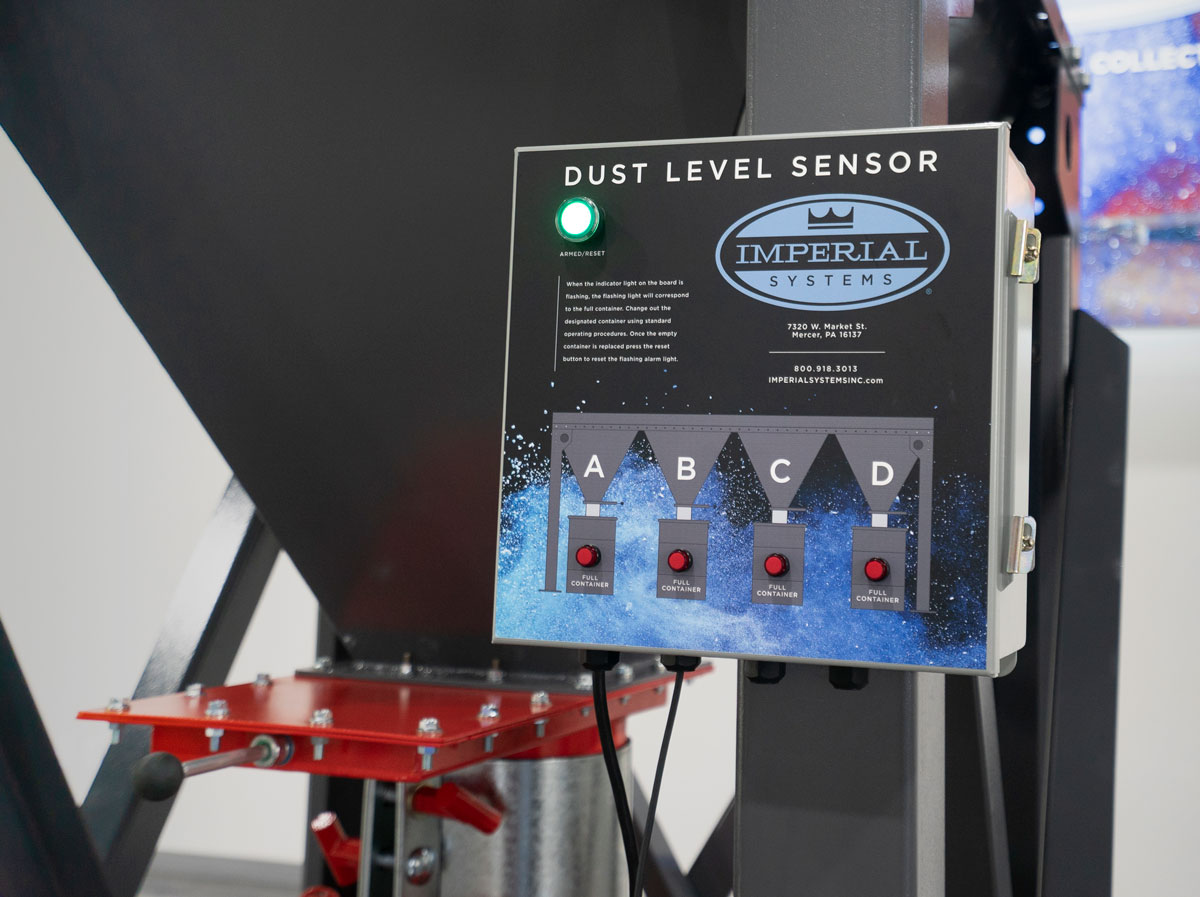
Feedback on Their Protein Powder Dust Collection
Keith reports that his experience with Imperial Systems is very good. He’s happy with the performance of the DeltaMAXX filters, although hopefully, it will get even better if the company uses Dust Level Sensors to control the hopper backup issues.
“I’ve gotten everything I asked for,” he says. “I plan to install these filters consistently in all our machines.”
The company plans to continue working with Imperial Systems in the future for any of their dust collection needs. While we can’t always get the filter prices quite as low as Keith would like them, we’re working with him to make sure he gets the longest filter life possible to save him money in the long run.
Read more
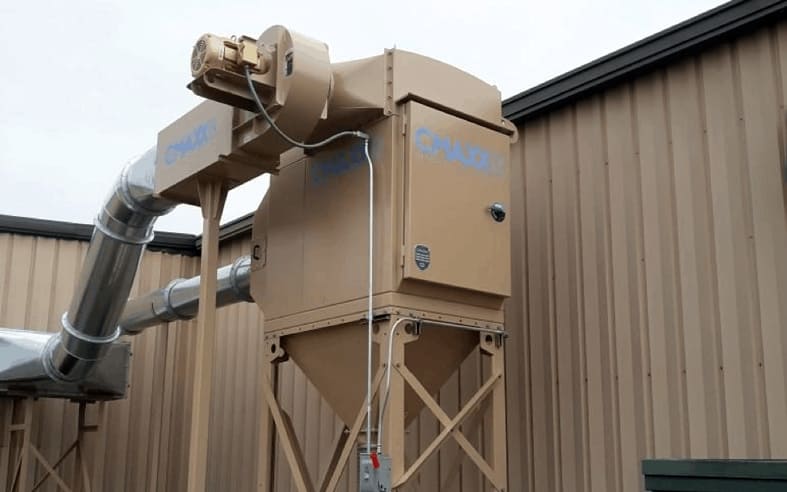
by Erin Long | Sep 26, 2019 | Case Studies
Problem:
A CNC machining company needed a dust collector to handle the dust from their 12 horizontal grinding mills. The company, located in northwestern Ohio, provides CNC machining services. Moreover, they produce a variety of metal parts for different industries. However, the company faced a grinder mill machine dust problem in the midst of a busy schedule.
The company’s grinding machines produce a large amount of dust. But this dust was migrating into the other departments. Furthermore, it caused quality control issues and premature wearing of machining.
The company contacted Cardinal Air Design to help them solve their grinding dust problem. The job had some special requirements, and the company needed a dust collector designed to meet their needs. Cardinal Air Design recommended an Imperial Systems CMAXX dust collector for the company’s grinder mill machine dust.
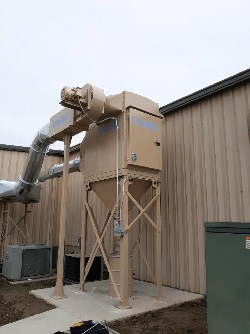 Solution:
Solution:
Cardinal Air Design created a dust collection system based around a CMAXX CM006 dust and fume collector. The six-cartridge collector also has a set of HEPA after-filters. The cartridge filters and after-filters provide extremely high-efficiency filtration for fine grinding dust.
The company also requested a dust collector to fit in with the exterior of their building. Imperial Systems powder coated the collector, including the supports and the collection drum, to match the building exterior.
Cardinal Air Design provided ductwork design and installation of the system. The company received a complete turnkey system. As soon as the installation was complete, they could turn it on and start controlling their dust problem.
Feedback on the Grinder Mill Machine Dust Collection
The company reports being very satisfied with Imperial Systems’ dust collector. They are also satisfied with Cardinal Air Design’s service and system design. The CMAXX dust collector with HEPA after-filters provides the high-efficiency filtration they need.
The matching powder coat on the Imperial Systems CMAXX is durable. But it also gives a clean, polished appearance to the building exterior. The company’s new system works without problems, and the grinder mill machine dust is under control.
Read more
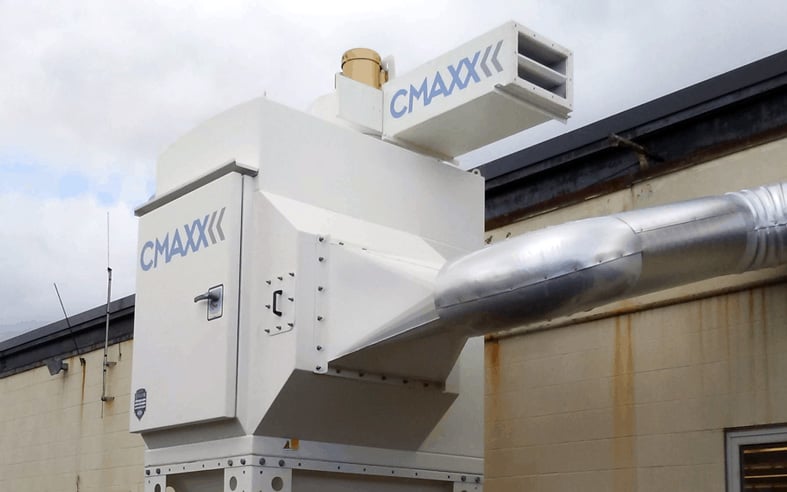
by Erin Long | Jul 31, 2019 | Case Studies
PROBLEM:
A company in Ohio produces parts for the aerospace industry using a salt bath. The modern aerospace industry relies on salt baths to treat metals for corrosion resistance. However, the high heat and particulate from this process caused serious problems for the company’s dust collector.
The company used a baghouse for their dust collection. However, the fumes, heat, and corrosive material caused rusting. The baghouse itself rusted, but so did the cages inside that support the bags. Corroded and damaged cages made changing the bags a challenge.
In addition, the facility produced such a fine dust that some of it escaped the baghouse. The fugitive dust often ended up in the building’s parking lot. The baghouse could not filter out this very fine particulate.
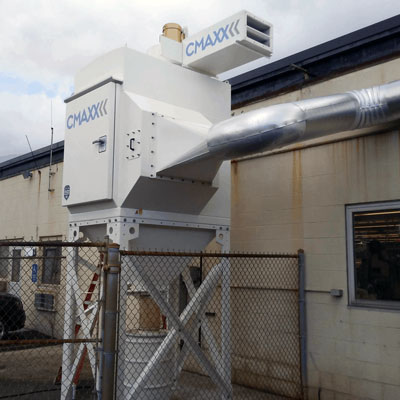 SOLUTION:
SOLUTION:
The company contacted Cardinal Air Design, an Imperial Systems representative in their area of Ohio. The dust collection system professionals at Cardinal Air Design developed a new system for the company. The new system uses a CMAXX cartridge collector, a CM006.
The cartridge filters provide the efficiency to capture the very fine particles from the salt bath application. In addition, the new system included special design features for this tough application. Insulation helps the ductwork withstand the heat. The CMAXX collector itself has an epoxy-coated interior and a stainless steel tube sheet. These features allow the collector to resist corrosion in this difficult salt bath application.
Because cartridge filters do not rely on metal cages for support, a cartridge dust collector avoids the issues of bag cages rusting. The higher efficiency of the cartridge filters also allows the capture of the very fine particulate, which had been a problem for the bags.
FEEDBACK:
With the new system in place, the company now has a reliable solution for its salt bath dust collection. The DeltaMAXX filters prevent dust from escaping, putting an end to the accumulation of fugitive dust outside the building. With the epoxy coating and stainless steel tube sheet, the company expects the CMAXX to hold up to the corrosive conditions.
In addition, the company appreciates the work of Cardinal Air Design, who assisted through the process. The specially designed dust collector and duct work solved some difficult problems. While a dust collector for a corrosive salt bath application posed a challenge, the company now has a good solution.
Read more

 Challenge
Challenge







 Solution:
Solution:
 SOLUTION:
SOLUTION: